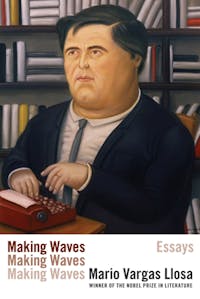Making Waves
Essays
 Download image
Download image
ISBN10: 0374532966
ISBN13: 9780374532963
Trade Paperback
368 Pages
$19.00
CA$26.00
Winner of the National Book Critics Circle Award
Spanning thirty years of writing, Making Waves traces the development of the Nobel Prize–winning author Mario Vargas Llosa's thinking on politics and culture, and shows the breadth of his interests and passions. Featured here are astute meditations on the Cuban Revolution, Latin American independence, and the terrorism of Peru's Shining Path; brilliant engagements with towering figures of literature such as Joyce, Faulkner, and Sartre; and observations about the dog cemetery where Rin Tin Tin is buried, Lorena Bobbitt's knife, and the failures of the English public-school system.
Reviews
Praise for Making Waves
"Making Waves is fascinating . . . [It] is a diverse and representative volume that allows us, for the first time, to trace this enigmatic, often brilliant writer's . . . intellectual journey."—Jay Parini, The New York Times Book Review
"In the star-studded world of the Latin American novel, Mario Vargas Llosa is a supernova."—Raymond Sokolov, The Wall Street Journal
"Vargas Llosa speaks in his own voice, sees through his own eyes. His vision is unique. His genius is unmistakable."—Eugenia Thornton, The Plain Dealer (Cleveland)
"A strong selection of the 60-year-old Peruvian novelist's journalism and literary essays, spanning 30 years of prodigious, passionate creativity. Such collections of fugitive works by great writers are tricky: some seem to consist largely of pet peeves and fragmentary musings. That's not the case here. Vargas Llosa writes with compelling insight, verve, and intelligence about even the most modest matters . . . He writes with vigor and clarity: essays produced in the 1960s and '70s on, say, the difference between Camus and Sartre, are just as alive and relevant now as when he wrote them. Naturally, Vargas Llosa writes a good deal about politics, especially South American politics. ('The raison d'être of a writer,' he reminds us, 'is protest, disagreement, criticism.') Though politicial essays are especially prone to seeming dated and irrelevant, in Vargas Llosa's hands the opposite is true. He cannily brings out the element of the permanent that inhabits the ephemeral. But perhaps his best efforts in this book are the literary essays. He turns his analytic gaze on Doris Lessing, Grass, Dos Passos, Faulkner, Cortázar, Bataille, Buñuel, de Beauvoir, Joyce, Bellow, Rushdie, and Havel, among others, to considerable effect. In addition, he has interesting things to say about such diverse topics as Lorena Bobbit, the British school system, and the grave of Rin Tin Tin. The collection is also of interest because it offers an intimate chronicle of Vargas Llosa's intellectual life, tracing his trajectory from the political left to the right, a transit he has made with admirable honesty and self-criticism."—Kirkus Reviews
"The eminent Peruvian novelist [has] produced a substantial body of journalistic writings, and in this omnibus collection covering three decades, selected by his translator King, he addresses topics as diverse as the work of Surrealist filmmaker Bruel, the World Cup of 1982, and the Lorena Bobbit grotesquerie . . . Vargas Llosa writes most effectively when discussing authors who have profoundly influenced him: Faulkner, Joyce, Sartre. Everywhere his conviction in the value of the writer's métier 'literature is fire' burns, and the writer's ability to effect social justice in society. He testifies to such a change now taking place in Latin America."—Amy Boaz, Library Journal
"This varied collection of essays, written over three decades and appearing in publications worldwide, traces the development of Vargas Llosa's thinking on government, society and culture . . . Vargas Llosa's luminous essays on literature embody a heroic view of writers as lonely rebels struggling against indifference and contempt . . . The pieces reveal a youthful and exuberantly idealistic Marxist slowly yielding, as if inexorably, to a radical liberalism born of a disillusionment with revolutionary politics . . . Ever tantalized by an insatiable hunger for beauty and justice, Vargas Llosa is a writer of great integrity and humor, and this new volume will be treasured by those who relish the brilliance and clarity of his prose."—Publishers Weekly
Table of Contents
Acknowledgements
Foreword
The Country of a Thousand Faces
When Madrid was a Village
Chronicle of the Cuban Revolution
In a Normandy Village, Remembering Paul Escobar
Toby, Rest in Peace
P'tit Pierre
Hemingway: The Shared Feast
A Visit to Bunuel
Luis Bunuel: A Festival of Excellent Bad Films
Simone de Beauvoir: Les Belles Images
Literature is Fire
Literature and Exile
Socialism and the Tanks
A Visit to Karl Marx
The Other Oscar
Doris Lessing: The Golden Notebook
Letter to Haydee Santamaria
Bataille or the Redemption of Evil
Sartre, Fierabras and Utopia
The Mandarin
Isaiah Berlin: A Hero of Our Time
Faulkner in Laberinto
William Faulkner: The Sanctuary of Evil
John Dos Passos: Manhattan Transfer
The World Cup, Spain 1982
The Story of a Massacre
Freedom for the Free?
Nicaragua at the Crossroads
My Son the Rastafarian
The Trumpet of Deya
Botero: A Sumptuous Abundance
Szyszlo in the Labyrinth
Degenerate Art
A Fleeting Impression of Vaclav Havel
Swiss Passion
Letter to Salman Rushdie
The 'People' and the 'Decent People': On Comtemporary Peru
The Death of Che
Nations, Fictions
Saul Bellow and Chinese Whispers
Visual Contact
The Penis or Life: The Bobbitt Affair
The Truth of Lies
Index
Reviews from Goodreads
BOOK EXCERPTS
Read an Excerpt
The Country of a Thousand Faces
The city where I was born, Arequipa, is located in an Andean valley in the south of Peru. It is well known for its clerical and rebellious spirit, its lawyers and volcanoes, its clear sky, the flavour of...
About the author
Mario Vargas Llosa; Edited and translated by John King
RELATED
Read Articles by the Author at the Guardian
How I Lost My Fear of Flying: FSG Work in Progress essay by Vargas Llosa



